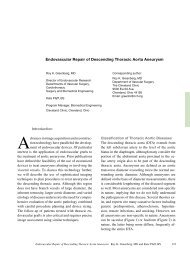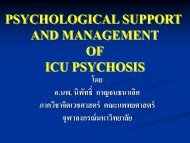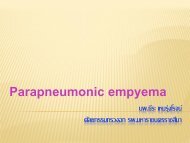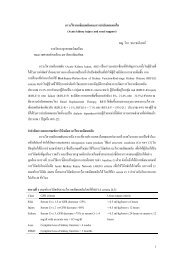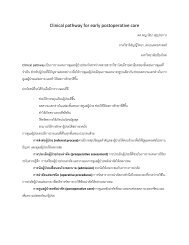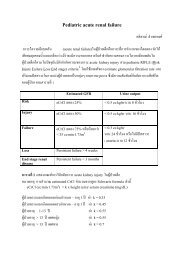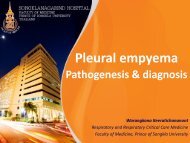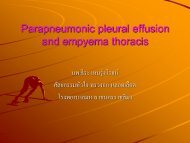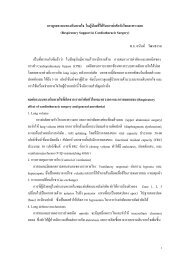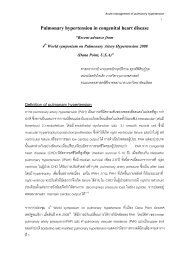Post Operative Management in Heart Transplant
Post Operative Management in Heart Transplant
Post Operative Management in Heart Transplant
You also want an ePaper? Increase the reach of your titles
YUMPU automatically turns print PDFs into web optimized ePapers that Google loves.
Art of Good Cook<strong>in</strong>g• Good Ingredient• Good donor + OK recipient• Good technique• Good team• Good tim<strong>in</strong>g• Good organization• Well practice
<strong>Heart</strong> <strong>Transplant</strong>: Peri-op Issues• Donor• Surgical techniques• Peri operative graft Failure• Imm-suppressive and rejection management• Renal function management
Issues: medium – long term• Renal function management• <strong>Transplant</strong> Allograft Vasculopathy• Malignancy• CMV <strong>in</strong>fection
Donor <strong>Management</strong>• Match<strong>in</strong>g• Donor cardiovascular care• Donor procurement and preservation
Donor Cardiovascular Care• M<strong>in</strong>imize effects of bra<strong>in</strong> dead physiology• DI• Hormone• Vascular tone• Fluid+ Electrolyte deranged• Over Innotropic drug• Low Hct• Low plasma osmolarity
Donor-recipient Match<strong>in</strong>g• Size: Greater than 80% of recipient bodyweight• Blood type: Identical or compatible• HLA-match<strong>in</strong>g: Generally not done• Direct X match only <strong>in</strong> preformedantibody found <strong>in</strong> recipient
Donor Procurement and Preservation• Preservative agent• St Thomas Cardioplegia• Blood Cardioplegia• Celsior• HTK solution Custodiol
Donor Procurement and Preservation• Ischemic Time• Optimum time : less than 4 hours• Acceptable to 6 hours• On arrival blood cardioplegia technique <strong>in</strong> longischemic time case
Surgical Techniques
Surgical Complications• Bleed<strong>in</strong>g• Mal alignment – Flow obstruction• Tricuspid regurgitation
Immediate <strong>Post</strong> Op Complications• Pump<strong>in</strong>g failure• Renal failure• Rejection• Bleed<strong>in</strong>g
Pump<strong>in</strong>g Failure• Graft preservation and Ischemic time• Hyper acute rejection – Acute rejection• Right heart failure• Pulmonary hypertension ?
Right Side <strong>Heart</strong> Failure• Most common cause of death <strong>in</strong> peri operative• Right ventricle is more prone to ischemic <strong>in</strong>jury• Th<strong>in</strong> wall - less reserve muscle contraction• Room temperature exposed
Right <strong>Heart</strong> Failure• High CVP• Distended Rt ventricle• Tricuspid regurgitation• High Pulmonary artery pressure(PAP) +/-• Low PAP but distended RV – very bad sign
Treatments of RV Failure• Decompress right side• Optimal preload volume• Over fill <strong>in</strong>creases Tricuspid regurgitation• Lower Pulmonary vascular resistance• Maximum ventilation support• Drugs : NTG, Isuprel, Primacor, Viagra• Nitric Oxide, Illoprost• Increase RV contraction• Mechanical support :• IABP• Ventricular assist device
Left Side Failure• Mostly from donor heart issues• Donor pre transplant condition• Ischemic time• Myocardium Preservation• Acute rejection is rare• Mostly result of reperfusion <strong>in</strong>jury
Treatments of LV Failure• Rest myocardium : Empty beat<strong>in</strong>g heart• Optimal <strong>in</strong>nothropic drugs• Optimal environment for myocardium recovery• Preload / Afterload• Blood gas, Electrolyte, acid base,calcium etc• Mechanical Support• IABP• VAD
Ventricular Assist Device
Bi Ventricular(a) Cannulation for CentriMagAssistBiVADDeviceTakayama H. et al.; Interact CardioVasc Thorac Surg 2011;12:110-111
Rejection
Immunosuppressive TherapyCNI• Cyclospor<strong>in</strong>e A• FK 506Antimetabolite• Azathiopr<strong>in</strong>e• MycophenolateSteroid• Adrenocortical steroidsLymphocytolytic Therapy• Anti-thymocyte globul<strong>in</strong> (ATG)
Induction TherapyRATG: Reduce• Acute rejection• Periop acute renal failure• Long term rejectionIncrease• Infection
Standard Triple therapy• Preoperative• Azathiopr<strong>in</strong>e: 4 mg/kg IV• Intraoperative• Methylprednisolone: 500 mg• <strong>Post</strong>operative• Cyclospor<strong>in</strong>e: 2-6 mg/kg po bid based on troughlevels and renal function• Azathiopr<strong>in</strong>e: 2 mg/kg/day• Methylprednisolone: 125 mg IV every 8 hours for 3-4 doses, followed by prednisone• Prednisone: (beg<strong>in</strong>n<strong>in</strong>g after Methylprednisolone)1mg/kg/day taper<strong>in</strong>g over 1 week to 0.5 mg/kg/day,
Ma<strong>in</strong>tenance ImmunosuppressionGoal• Lowest overall level of immunosuppression toprevent rejection• Cyclospor<strong>in</strong>e levels• Low therapeutic after 1-2 years• Azathiopr<strong>in</strong>e• 1-2 mg/kg/day after 1-2 years• Prednisone• 0 - 0.1 mg/kg/day after 1 year
Problem with CNI• Renal toxicity esp dur<strong>in</strong>g critical period• Injured and recover<strong>in</strong>g myocardium• Injured renal after CPB• Compromised cardiac output and renal perfusion
CNI free Regimens• m TOR <strong>in</strong>hibitor• Sirolimus (Rapamune)• Everolimus (Certican)• No renal toxicicty• Higher rate of rejection <strong>in</strong> de novo used.
Strategies :Renal ShutdownImmediate <strong>Post</strong> Op• Prolonged Induction• Higher rate of <strong>in</strong>fection• CNI free regimen de novo• Higher rate of rejection• Lower CNI comb<strong>in</strong>ed with mTOR• Forget kidneys and protect heart• Renal transplant after kidney transplant?
Rejection• Endomyocardial biopsy• Acute rejeciton• Hospital• Out-patient
Rejection
Rejection
Rejection
TREATMENT OF REJECTIONGRADEMildModerateModerateSevereNone or oral corticosteroid augmentationOral corticosteroid augmentation or IVcorticosteroidsIV corticosteroids +/- ATG or OKT3
InfectionMost of fatal <strong>in</strong>fection <strong>in</strong> post op heart transplantcame from• Colonized pre transplant (poor conditionrecipient)• Consequences of prolong postop heart failure;prolong <strong>in</strong>tubationCMV is the most common <strong>in</strong>fection problem <strong>in</strong>medium and long term
Infection• Pre transplant prolong <strong>in</strong>tubation is the mostimportant risk factor <strong>in</strong> post transplant <strong>in</strong>fection• Prolong post transplant <strong>in</strong>tubation must beavoid• <strong>Post</strong> op renal failure contribute to fatal <strong>in</strong>fection
Infection• Bacterial - Most Common• Viral• Fungal
Infectious ProphylaxisPathogenicOrganismCytomegalovirusHerpes simplexToxoplasmosisPneumocystisOral candidiasisProphylactic AgentGancyclovir, Acyclovir, IVIgAcyclovirPyrimetham<strong>in</strong>e andLeucovor<strong>in</strong>TMP/SMX, Dapsone,Pentamid<strong>in</strong>eNystat<strong>in</strong>, Mycelex troches
Peri operative Renal Failure• Poor renal perfusion• Poor cardiac function• <strong>Post</strong> cardio pul bypass <strong>in</strong>jury• CNI toxicity <strong>in</strong> not fully recovered renal• Induction Therapy : give renal toxic freew<strong>in</strong>dow period
Renal Failure• Most important side effect of cyclospor<strong>in</strong>—from afferent arteriolar vasoconstriction anddirect tubular cell <strong>in</strong>jury;• Dose related to some extent and will improvewith reduction <strong>in</strong> the Cyclospor<strong>in</strong> dose
Peri operative renal failure• Extended <strong>in</strong>duction technique• Intermittent RATG after complted normal <strong>in</strong>ductionduration• Follow CD 3• CNI free until renal recover• Significantly <strong>in</strong>crease <strong>in</strong>fection
Common Dilemmas• Poor cardiac function• Cannot extubate• Cannot start oral CNI• Prolong use of RATG : over suppress• Infection flare up
Common Dilemmas• Poor cardiac function• Poor ur<strong>in</strong>e flow• Cannot start oral CNI• Higher risk of rejection
Conclusions• Donor recipient condition – Most important• Right side heart failure is the most commoncause of operative dead• Prolong poor cardiac function leaded toprolong <strong>in</strong>tubation and fatal <strong>in</strong>fection• <strong>Post</strong> operative care is the most difficult aspect<strong>in</strong> heart transplant
Thank you




